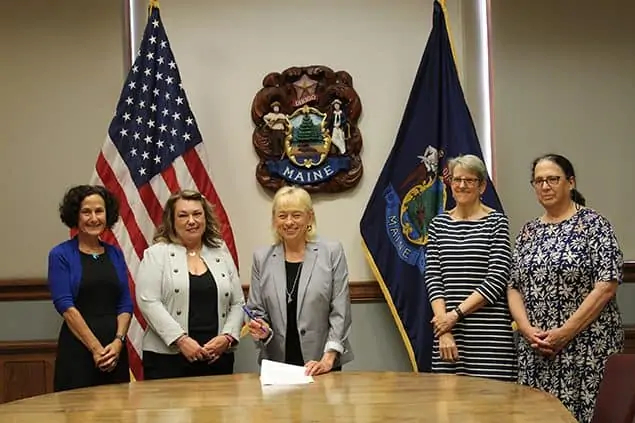WES Global Talent Bridge is publishing a series of blog posts that highlight the critical work and unique perspectives of the IMPRINT Coalition. The New Mainers Resource Center (NMRC) is a Portland Adult Education program serving immigrants, refugees, and employers in the Greater Portland area. The NMRC’s Program Coordinator, Sally Sutton, has been a leader in advancing legislation that reduces barriers of entry to the workforce for internationally educated workers in Maine.
Maine, a state whose populace is one of the oldest in the country, reached a critical demographic tipping point in 2020: It now has more residents age 65 or older than under the age of 18. With a diminishing proportion of working-age Mainers, the state is facing increasingly acute worker shortages.
A group of community leaders wants to tap into the potential of immigrant and refugee communities in the state to help solve this problem. Thanks to the group’s efforts, Maine is emerging as a national leader in developing more inclusive local workforce policies.
Recognizing the Opportunity
The immigrant population will be what revitalizes Maine’s economy, said Sally Sutton, program coordinator at the New Mainers Resource Center (NMRC), Portland Adult Education—an IMPRINT member that’s been instrumental in championing policy change. To address the state’s extensive worker shortages, Sutton noted, it is essential to remove barriers and work toward including immigrants and refugees in Maine’s workforce.
Maine is home to 10,200 immigrants and refugees with college degrees, many of them earned in other countries. Yet nearly 21 percent of these individuals are unemployed or underemployed. Sutton’s work administering NMRC’s career advising, job readiness, and English-language learning support programs offered her a unique perspective on how systemic barriers prevent people with international credentials from advancing in their careers.
Developing an Effective Response
Obstacles to professional licensure were among the top barriers Sutton’s clients faced. For example, to practice as a doctor, nurse, or pharmacist in Maine, applicants with credentials from other countries historically had to repeat their education—a multi-year process that can cost tens of thousands of dollars. Compounding the situation was the fact that Maine—a state that had previously had some of the lowest levels of immigration in the nation—had limited experience processing licensure applications from immigrants and refugees who held international credentials.
Sutton set out to address her clients’ needs by advocating more funding for adequate English-language and bridging programs, inclusive licensing laws, and improved career navigation services.
Eight years after the NMRC launch, Sutton and her team have helped create a statewide network of non-profit leaders, elected officials, and other stakeholders to develop and scale programs focused on immigrants and refugees who earned their credentials abroad.
“For me, it all starts with the individual and what that person needs to be successful,” Sutton said. “I have an opportunity to both work with individuals and also have a voice at the macro or system level.”
Seeing State-Level Progress
Last year, Sutton and other advocates saw several breakthroughs: The State Workforce Board established an Immigrant Workforce Committee to identify issues and best practices related to the recruitment, retention, and employment of immigrants in Maine. This year, statewide momentum continued with the passage of several bills in the Maine legislature.
These new laws expand workforce development programming to support English-language acquisition classes by reducing the wait-list and increasing the levels, frequency, and intensity of the instruction offered. The laws established the Career Advancement and Navigation Initiative in Maine’s Department of Education so that individuals experiencing unemployment or underemployment can acquire the preparation they need. One of the more important pieces of recent legislation involves updating licensing regulations in order to foster a more inclusive workforce.
We spoke with Anne Head, commissioner of Maine’s Department of Professional and Financial Regulation, who stressed the significance of this urgent work. “Providing pathways to professional licensure for Maine’s internationally trained and educated population is the most important and meaningful work of my agency today,” she noted.
Ensuring Meaningful Change
In collaboration with other state and local stakeholders, NMRC continues to address systemic hurdles. The Maine Business Immigration Coalition is forging partnerships with local employers to raise awareness of untapped talent pools, including immigrants and refugees who hold international credentials. The Maine Department of Professional and Financial Regulation offers case-specific support to immigrant and refugee applicants who are navigating licensure processes. Leaders in cities with growing immigrant populations, like Portland and Lewiston, have allocated funds for workforce development projects focusing on including immigrants and refugees.
“With these initiatives Maine is moving in the right direction, but change doesn’t happen overnight. It takes time—with continued and persistent advocacy—to make sure there are meaningful results and not just window dressing,” Sutton pointed out. “Maine is a small state and people have been working together for a long time, with various organizations taking on different pieces of this shared agenda. But we all believe that the more diverse our workforce is, the better our state will be.”
IMPRINT, a national coalition based at WES, is tracking state and local policies aimed at reducing barriers to the economic integration of immigrants and refugees who hold international credentials. Learn more about new laws in Maine and other states here.



